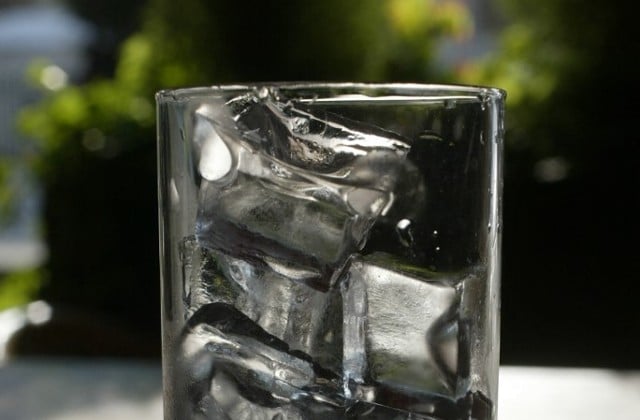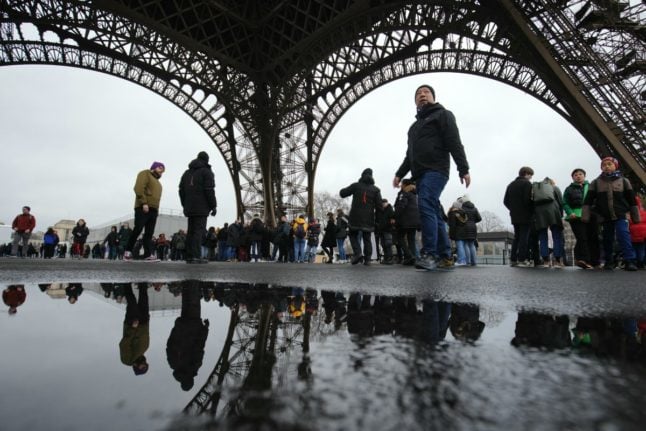A rumour has been buzzing across social media that café patrons in the French capital charge extra for ice in your drink.
The discussion around expensive glaçons began when a tweet by the account ‘AlertesInfos’ was published on Monday, allegedly showing a bill from a Paris bistro charging the recipient €72.80.
It included four 12cl bottles of Perrier (mineral water), charged at €15 each, as well as 16 ice cubes, at €0.80 a piece.
The tweet gained traction when former French politician and presidential candidate from the Socialist Party, Ségolène Royal, shared it.
C’est la faute de @JLMelenchon ? La #canicule, le réchauffement climatique et la facturation des #glaçons , c’est lui ! 🤫 https://t.co/8xofOMLmxw
— Ségolène Royal (@RoyalSegolene) July 17, 2023
However, despite the tweet’s popularity, having been viewed over one million times as of Tuesday evening, it is actually a fake, as reporting by Le Parisien established.
The bill was likely falsified from an original image shared on Twitter in 2019 by journalist Nora Hamadi. The true image showed a receipt for €30, with five mineral waters adding up to €27.50 and five lemon slices, equalling €2.50, charged.
Iced drinks
While ice in your drink will not cost you extra, you do need to specifically request it.
Soft drinks in France are usually served without ice, so if you want your beverage iced, you need to request the drink avec glaçons – with ice – when you order.
While you will not be charged for ice, it is possible you could be charged for lemon slices – especially if you are in a café in a tourist area of Paris. This is not common, but be sure to double check.
Mineral water
While ice cubes are free, water can be surprisingly expensive – especially in tourist hotspots of Paris.
The original tweet, which was later doctored, was a complaint about the high cost of mineral water at a Paris café.
If you simply ask for d’eau (water) you will usually be brought mineral water – and it’s not uncommon for this to be more expensive than wine or beer.
One simple way to avoid this is by ordering tap water, which is free (and entirely safe to drink) – specify une carafe d’eau or un pichet d’eau when you order and you will be brought a jug of tap water.
The French government passed nationwide legislation in January 2022 requiring bars, cafés and restaurants to offer free tap water to customers. The text of the law says: “Food and beverage establishments are required to visibly indicate on their menu or on a display space the possibility for consumers to request free drinking water”.
The city of Paris is also encouraging people to drink tap water when they are out and about, rather than buying plastic bottles of mineral water.
One of the biggest uses of single-use plastics is water bottles – across France 8.7 million plastic bottles of water are sold each year and only half are recycled.
In fact, the city of Paris launched a campaign called Je choisis l’eau de Paris (I choose Paris water) in 2022 to encourage people to avoid single-use plastics, by instead buying a bottle and refilling it with tap water. Bars, cafés, shops and restaurants that display the l’eau de Paris logo will refill your bottle for free, even if you don’t buy anything.
Soft drinks vocabulary
Une carafe d’eau (or un pichet d’eau) – a pitcher of water. This is what you should ask for if you want regular, tap water. In some parts of France, people might instead say pot d’eau or cruche
Avec glaçon – with ice
Eau non potable – Non-drinking water. If you see a sign that says this, do not drink the water as it is likely used for cleaning or other purposes.
Eau potable – drinking water
Citron – lemon
L’addition – the bill
L’eau minérale – mineral water
Gazeuse – fizzy/sparkling
Plate – flat



 Please whitelist us to continue reading.
Please whitelist us to continue reading.
Member comments